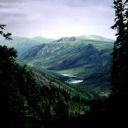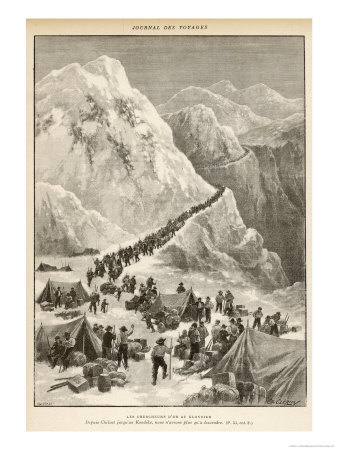![]() by Kate Bridges
by Kate Bridges
I love writing about people. About their relationships to each other, and not just the romantic kind. Of course I love writing about the battle of the sexes, but family and friends are a prominent theme of my novels, too. The most fascinating thing I discovered while researching my latest books, set in the Klondike Gold Rush, were the people — the hard-headed, the odd, and the normal folks — who dropped everything they were doing to head to the Yukon.
 In the late 1890s when news of a major gold strike first reached the rest of North America, many folks made a mad dash for this wild frontier. Many of them thought it was their last chance to hit it big.
In the late 1890s when news of a major gold strike first reached the rest of North America, many folks made a mad dash for this wild frontier. Many of them thought it was their last chance to hit it big.
The mayor of Seattle walked off the job and jumped on a ship to Alaska. Judges left their posts, farmers walked off their land, seamstresses paid their last cent for a ticket north. Office workers who’d never held a shovel in their lives boarded the first train that took them to the west coast.
So many Europeans, as well as stampeders from across the U.S. and Canada, joined the trails that the dogs they brought with them forever changed the bloodlines of Huskies.
 A hundred thousand people arrived in Alaska. This was just the beginning of their journey, for the gold was located over the mountains near Dawson City, Yukon Territory. Only a third who set out made it. Many of those left behind became millionaires anyway, servicing the miners who’d struck it rich and had nothing to buy in the wilderness. Enterprising folks set up restaurants, offered their services as tour guides, built casinos and steamboats.
A hundred thousand people arrived in Alaska. This was just the beginning of their journey, for the gold was located over the mountains near Dawson City, Yukon Territory. Only a third who set out made it. Many of those left behind became millionaires anyway, servicing the miners who’d struck it rich and had nothing to buy in the wilderness. Enterprising folks set up restaurants, offered their services as tour guides, built casinos and steamboats.
Many folks were separated on the trails. There were no methods of communicating—no telegraph lines, no telephones, no trains—so if a person got into an argument with a traveling companion and separated, that was often it forever. Although many tried to find each other later, most were unsuccessful.
The heroine in Klondike Fever gets separated this way from her sister. And Lily is one of those people who dropped everything to join the Gold Rush. She’s trying to find her way back to her sister when her plans fall apart…she’s robbed on the stagecoach returning to Alaska and is shackled to a man she used to work for as a servant.
“Shotgun Vows,” my novella in Western Weddings, features a family who are setting up shop in the Yukon and are trying to do their best for their daughter, but unfortunately wind up interfering in her life.
 So tell me what you think: are there any interesting family members in your history who’ve done something unusual on what seemed to be the spur of the moment? Or maybe it’s you? Maybe you packed up and headed to a new place?
So tell me what you think: are there any interesting family members in your history who’ve done something unusual on what seemed to be the spur of the moment? Or maybe it’s you? Maybe you packed up and headed to a new place?
For a chance to win an autographed copy of Klondike Fever or Western Weddings, please post a comment or question today. I’ll draw two winners. I’m also donating two more books to the grand prize basket for the end of the month.
If you’d like to see the photos I took on my research trip to Alaska and the Yukon, or to join my newsletter, please visit my website.
Now I pass it over to you.

Loved the excerpt, Kate. I don’t have any ancestors who broke into the unknown, but some of my husband’s were among the first 4 families to settle in this part of Texas, now the only remaining family still running the ranch they established back before the Civil War. One of those ancestors was a prisoner at Vicksburg.
I fear I’m too timid to set out boldly into the unknown…so I do my travelling in books like yours!
Thanks, Julia! Nice to see you here. Wow, that’s quite a rich family history your hubby’s got! I had no idea. Must be some juicy stories in there somewhere for a novel or two! 🙂
Kate
Hi, Kate! I have to say that your books sound extremely intriguing. I fell in love with the period and the territory as a young child, reading Jack London’s novels.
To answer your question…
Four generations ago, two brothers emigrated from France to Cuba with their families. They promptly became estranged. As a result, my paternal great grandfather hauled his family to Mexico and never spoke to his brother again.
The weirdest thing is that my generation has been able to contact the original family back in the south of France, but still nothing on the Cuban side of the family.
I guess I have some of that wandering gypsy blood in me, as I’ve lived in four different countries so far 😀
Hi azteclady! 🙂 Thank you for your comments. I’m really intrigued by Jack London’s stuff, too.
From France to Cuba…how interesting. And then again to Mexico. As a writer, I’d love to know what that family estrangement was all about. I’m sure we all have something like that in our own family trees.
You do sound like a gypsy, in an adventurous way!
Kate
Hey Julia, are you still in Texas? Come to San Antonio and visit 😉
Kate, when you said :
Were there really a lot of women who went looking for gold? I figured it was mostly men after it.
Wow! That era and place is fascinating. It must suggest hundreds of stories to you–or maybe a hundred thousand.
My ancestors on my mother’s side got off the boat from Ireland in the early 1800’s and started working west. They wound up in East Texas on land inhabited by the Alabama and Coushattas. There are lots of good stories about them.
My father’s people were plantation owners in South Carolina. Unfortunately, they backed the wrong horse during The War Between The States and lost nearly everything. They eventually made their way around Florida by sea, thence up the Red River to Jefferson, Texas and then to overland to Dallas. Which, according to my grandmother was, “Just a muddy street with cowboys and rough people.”
They settled across the river at La Reunion, a French uptopian colony where, “They had books and flowers and spoke French and were civilized.”
Patti
Sybil, you’re right that it was mostly men. But I was really surprised to learn that a fair number of women went as well. (Haven’t found exact figures, but I’d guess somewhere between 5 and 10%) Besides prostitutes who wanted to earn a rich living, there were nurses and entertainers and wives and mothers, and photographers and journalists, even some ladies who guarded female prisoners on behalf of the Mounties. Good question!
Patricia–howdy! You’re lucky you know so much about your family history. I hope you’re writing it down for your kids. You have an interesting (entertaining )way of looking at it all.
Kate
I’m going to leave the contest open overnight, for anyone who’d like to post. I’ll draw the winners for the books first thing in the morning!
Kate
Yes, Sybil, I’m still in TX and get to SA area fairly frequently–have two kids at UT Austin, one a cheerleader so we come down to some of the UT games. Love that area of TX.
Patti, what a fascinating history. I’d love to know more about the La Reunion area of Dallas…but I guess Utopia works better as idea than actuality.
How sad, azteclady, that the Cuban branch of the family got “lost.” Maybe with the wonder of the internet now you can work with the other branch and trace them.
Let’s see I came over theUK when I got married. So I am the one who moved.
But going further back, my paternal grandmother’s family were among those to settle in Chicago when it was still Fort Deerborn. The mother and five of the daughters walked from New York. The father and a couple of other children had gone ahead to get the cabin ready. At one point one of the daughters became ill and could no longer walk, and she had to be given to a man in a buggy. They had no idea if they would see her in the next town or not. Luckily they did. They also arrived inFt Deerborn just when there was a convention of Indians in town, the mother sat up all night, going over her life, convinced each breath would be her last!
Michelle, hi! Wow, what a walk from NY to Chicago. And how trusting people had to be, to hand over their daughter like that. I forgot about you moving to the U.K…must have been quite an experience, changing countries. But also very adventurous and not to mention great fertile ground as a writer!
Kate
Your story sounds so intriguing, Kate! I love the idea of the Yukon.
I have family that live in Alaska. Even today, living there is an adventure! But they love it dearly and are very happy there. I keep hoping to make it for a visit!
And the winners are…drum roll…
Azteclady for KLONDIKE FEVER. Congratulations!
Patricia Frances Rowell for WESTERN WEDDINGS. Hope you haven’t read it yet, Patti!
Could you both please email me through my website and give me your mailing addresses? Thanks!
http://www.katebridges.com
Kate
Good morning Deb!
How lucky that you’ve got someone to visit in Alaska! It’s beautiful country. Definitely fun to visit, and to bring kids along.
Kate
What is funny about moving to the UK is that I never really considered it an adventure or brave. I just did it, and luckily it has worked out. But the internet has made it so much easier to stay in touch.
Yes, the trust that people used to have in times of poor communication was great.
They did the trip in the 1833, so I think people just were hardier. Back then Chicago was the frontier and the West. As a child, it me awhile to get my head around that.
OH and I would love to go to Alaska some day.
Yay! 😀 Thank you, Kate!
Off to email…
Congrats, Patricia!
How much good fun Julia! You will have to let us know when you are in the area. Do you ever do signings around here?
I can totally get the prostitutes thing… although ick hope they had to take baths first cuz some of them look REALLY rough when you see the pics of old miners.
That or they charged enough to make it worth it… ugh.
But the idea of a woman panning for gold is interesting. Of course there is Jane? uh crap I am completely blank… she was a character on deadwood. I can’t member if mining was just one of the many things she did or was something she set out to do. LOL I am SURE one of you author types know *g*